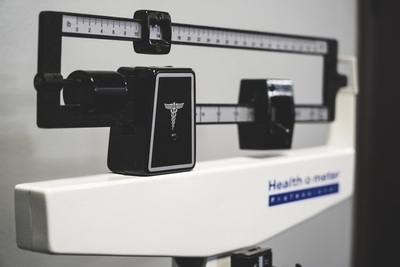Thyroid issues can be difficult to diagnose on their own. This is due to the fact that they can be mistaken for other health issues such as menopause or cognitive problems. On the other hand, there are early warning signs of thyroid issues that you should be aware of.
7 early warning signs of thyroid issues include:
- Fatigue
- Weight gain
- Weight loss
- Slowed heart rate
- Increased heart rate
- Sensitivity to heat
- Sensitivity to cold
While these symptoms may point to a problem with your thyroid, only a medical professional will be able to confirm it beyond a shadow of a doubt. Our team of board certified physicians are here to help diagnose your thyroid disease and develop a treatment plan that will help restore your health.

1. Fatigue
It can be easy to use fatigued and tired interchangeably, but the fatigue experienced by those with hypothyroidism and other thyroid disorders is significantly different. While feeling tired can often be fixed with a good night’s sleep, it’s not enough to cure fatigue caused by thyroid disorders.
This can be especially hard to discern for middle-aged women since fatigue is a common symptom of menopause. However, millions of women experience unresolved menopausal-like symptoms even after taking estrogen. According to the American Association of Clinical Endocrinologists (AACE), this may be a sign of an undiagnosed thyroid disorder.
2. Weight Gain
The thyroid plays an important role in your weight since it regulates your metabolism. Problems with your thyroid can result in your metabolism not working properly and can greatly affect your body weight.
One of the earliest ways to test for thyroid disorders was to measure a patient’s BMR, or basal metabolic rate. With this test, your metabolism is assessed by measuring how much oxygen the body uses over a certain period of time. In this case, a low BMR score would indicate hypothyroidism.
For most people, hypothyroidism will result in some weight gain that can go unnoticed. However, severe hypothyroidism can result in much more dramatic weight gain with the addition of 5 – 10 extra pounds. This weight gain isn’t always due to gaining more fat. Instead, it can be due to retaining water and salt in the body.
3. Weight Loss
Problems with your thyroid can also lead to weight loss. Unlike hypothyroidism, which involves the thyroid gland underperforming, hyperthyroidism is when the thyroid is overactive. In these cases, your BMR results would be much higher than normal.
Similarly to weight gain, the amount of weight you lose due to an overactive thyroid will depend on the severity of your condition. An extremely overactive thyroid uses up more calories than a healthy or underperforming thyroid does. Failure to feed your new caloric requirements can eventually lead to weight loss.
On the other hand, hyperthyroidism also increases your appetite so some people actually gain weight despite having an overactive thyroid. This just goes to show the complexity of the thyroid and the role it plays in weight and metabolism. Other factors do play a part in weight, but the health of your thyroid is still an important indicator.
4. Slowed Heart Rate
The health of your thyroid can also have an impact on your cardiac health. For instance, hypothyroidism results in an insufficient amount of thyroid hormone which leads to a slower heart rate.
This can affect more than just your heartbeat. Over time, insufficient thyroid hormone can also cause your arteries to lose elasticity, which can result in high blood pressure due to it taking more work for blood to circulate. Higher cholesterol levels can also occur due to hypothyroidism.
5. Increased Heart Rate
Those with hyperthyroidism experience an increased heart rate rather than one that has slowed down. When too much thyroid hormone is produced, you can experience heartbeats that are faster, harder, and occur at irregular rhythms.
This can result in:
- Atrial fibrillation, which is when irregular beats occur in the upper chambers of the heart
- Palpitations, which is when you suddenly become aware of your heartbeat
Like with hypothyroidism, those with hyperthyroidism can also develop high blood pressure. You can also experience chest pains or angina due to a combination of high blood pressure and arteries that are clogged or stiff.
6. Sensitivity to Heat
Sensitivity to heat is a common symptom of an overactive thyroid. As we mentioned with weight loss, hyperthyroidism causes your metabolism to go into overdrive and use up more calories. This doesn’t only affect your weight, though. Too much of the thyroid hormone known as thyroxine can also cause you to be much more sensitive to heat.
Heat sensitivity, or heat intolerance, is more than just being “hot-natured.” People dealing with an unusual sensitivity to heat feel hot when others feel comfortable or even cold. This can cause people with hyperthyroidism to experience abnormal sweating and even anxiety due to feeling hot.
7. Sensitivity to Cold
People with hypothyroidism often experience cold hands and feet. This can even occur in rooms where everyone else feels hot. This happens due to your body not producing enough thyroxine, causing your metabolism to slow down. Eventually, hypothyroidism impedes your body’s ability to create energy that keeps you naturally warm, resulting in becoming extremely sensitive to cold temperatures.
Thyroid disorders can affect you in various ways, even in opposite ways depending on the type of disorder you have. This can include energy levels, weight, heart rate, and how you react to heat and cold. While these symptoms may point to a thyroid issue, you’ll need to speak with a medical professional for an accurate diagnosis as well as a treatment plan.
Have you noticed symptoms that could be caused by a thyroid disorder? Email us today with any general questions you may have and begin your journey to better living.
Evansville Surgical Associates has been providing comprehensive and compassionate surgical care for over 50 years. Call us at (812) 424-8231 or (800) 264-8231. We are available from 8:00 am to 4:30 pm if you would like to schedule an appointment.



